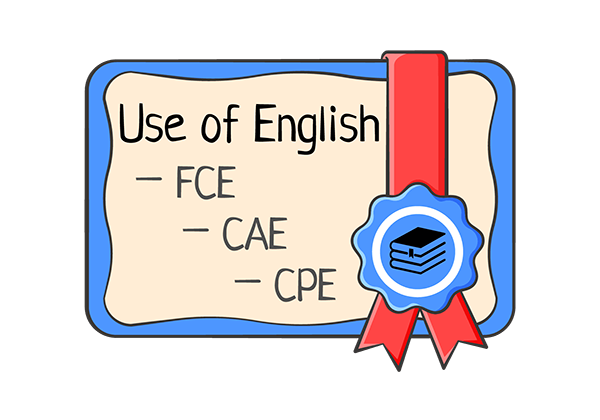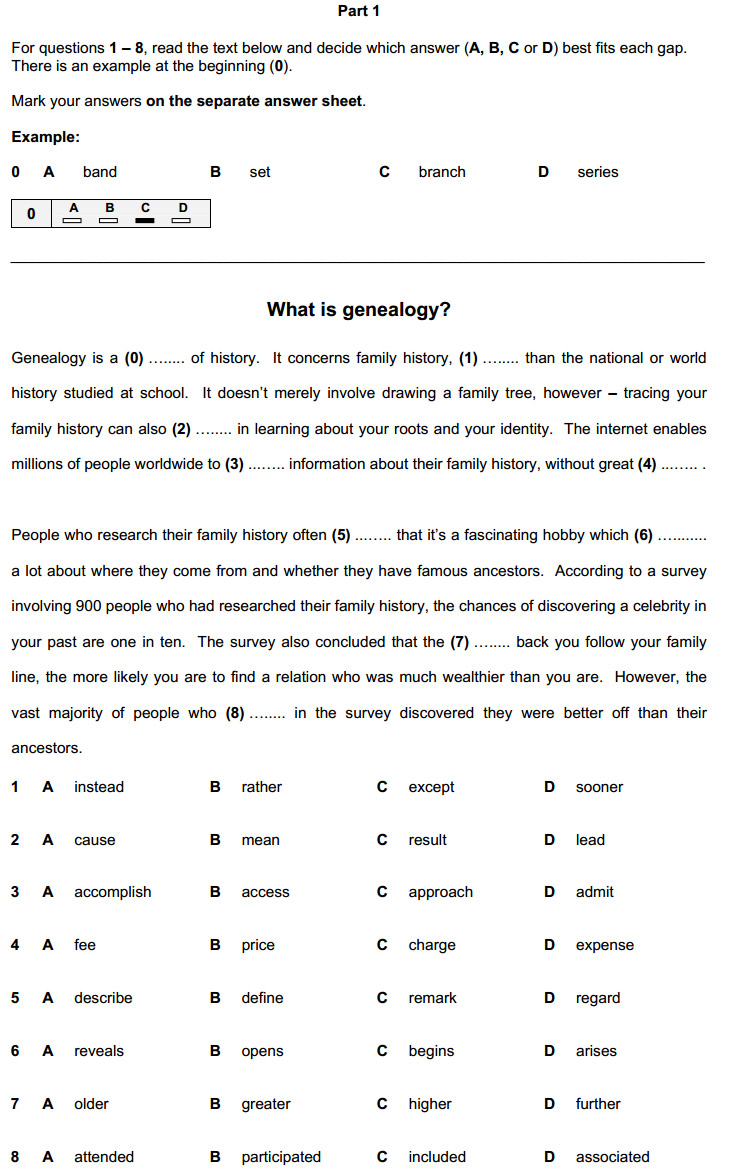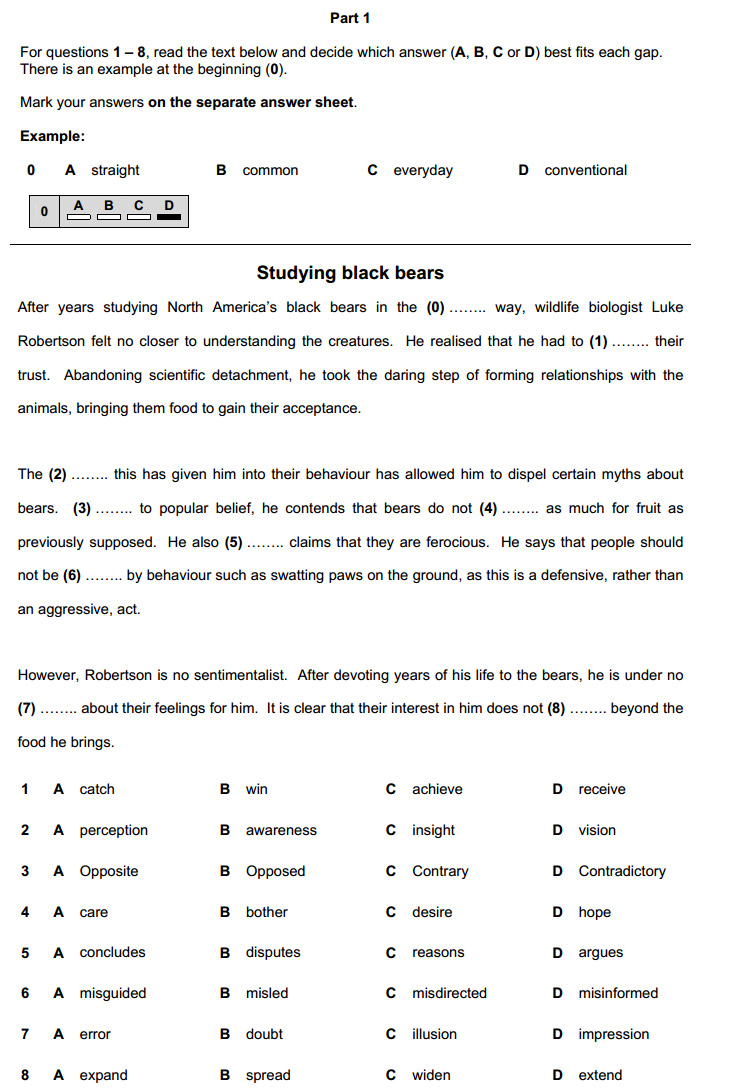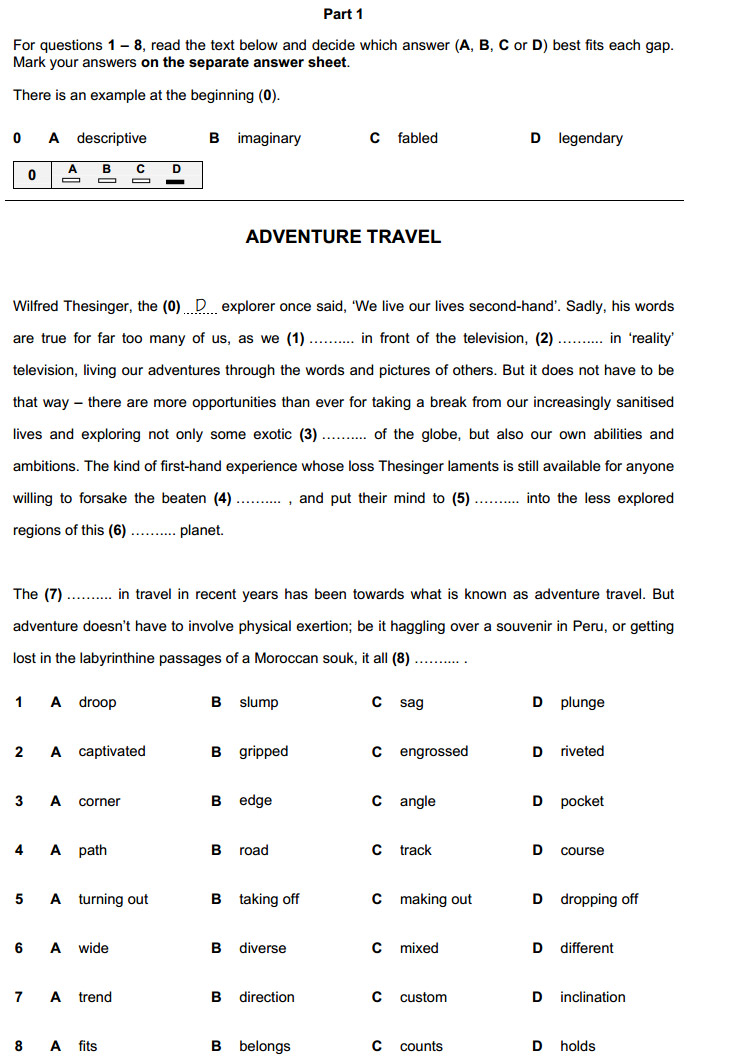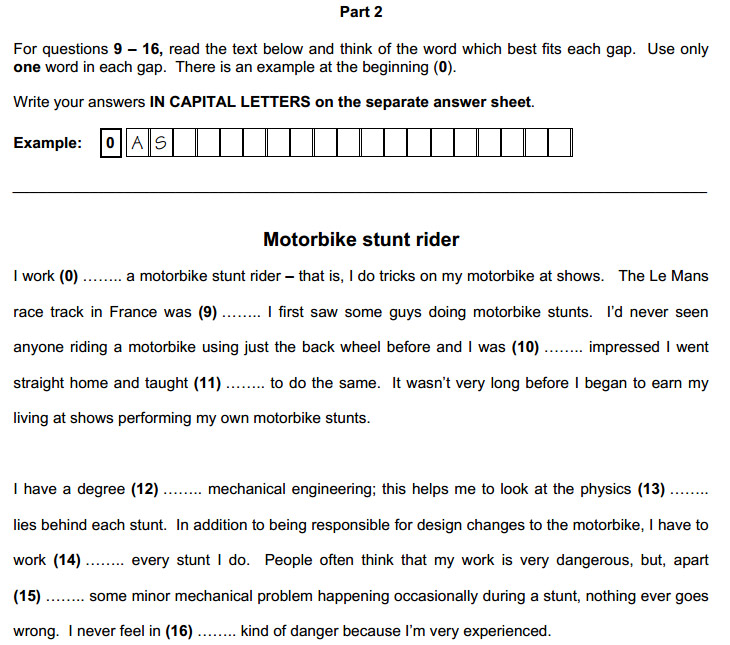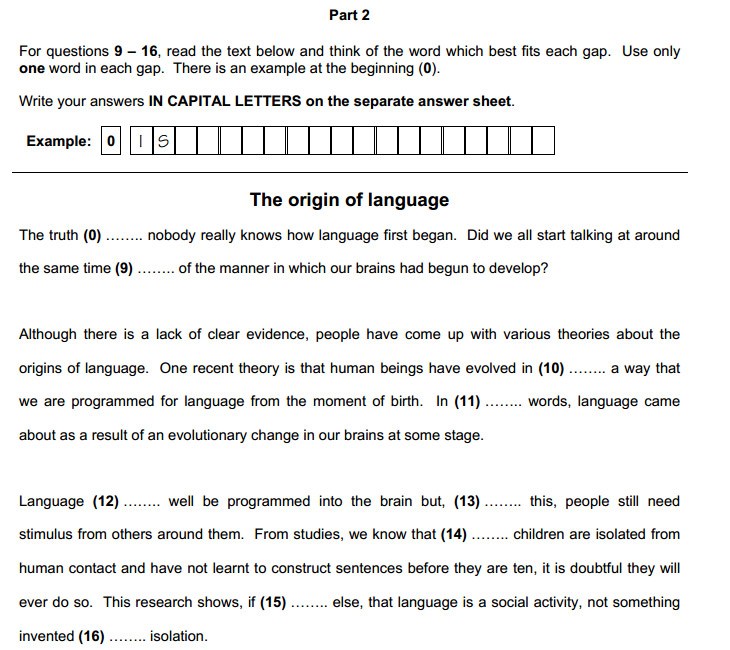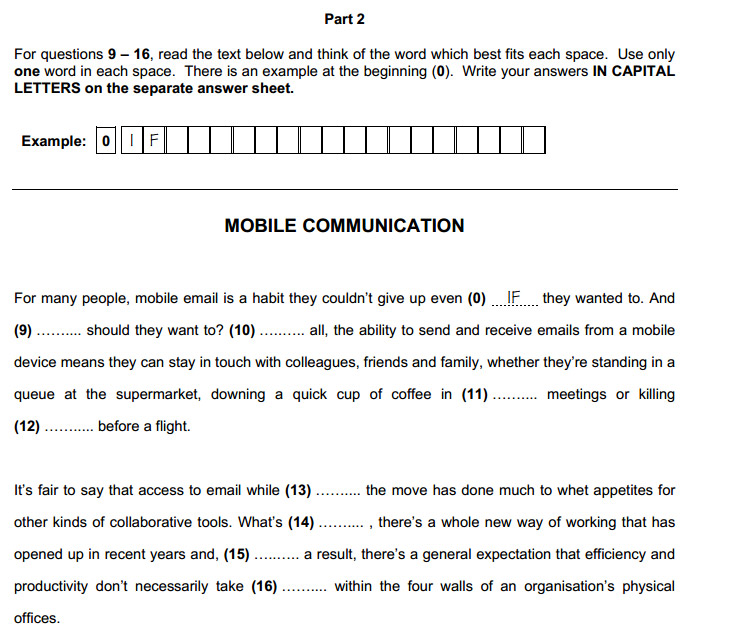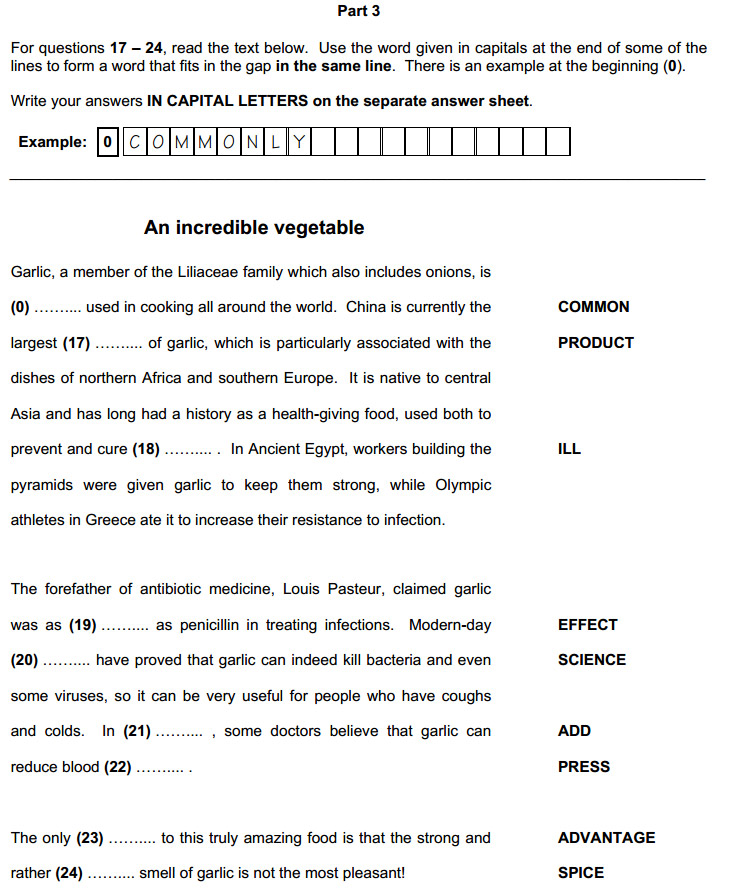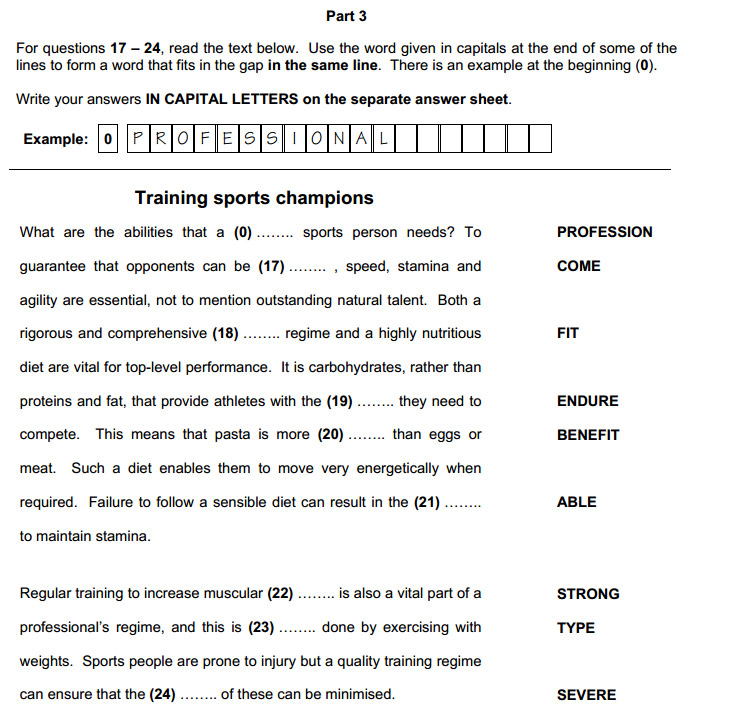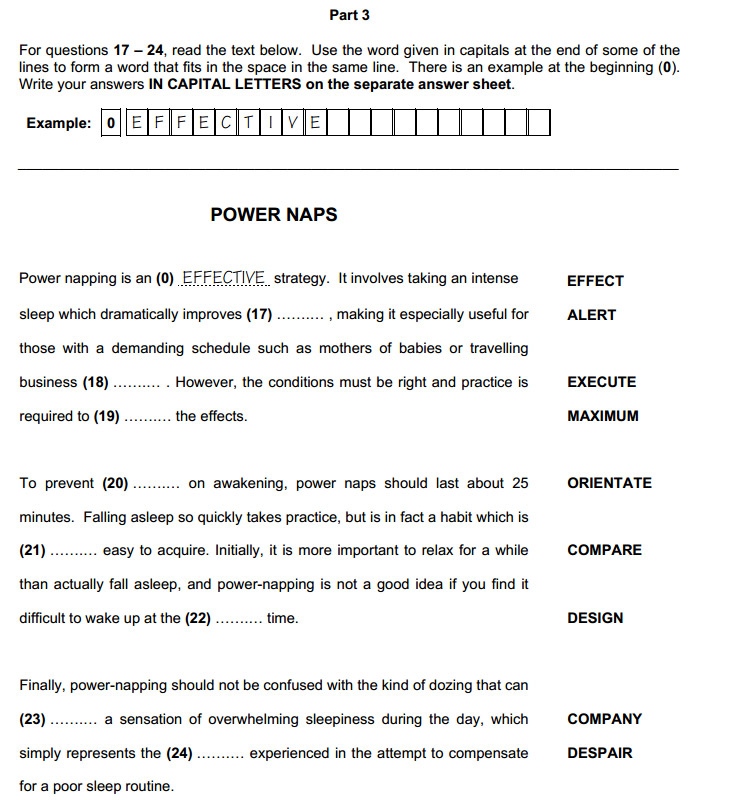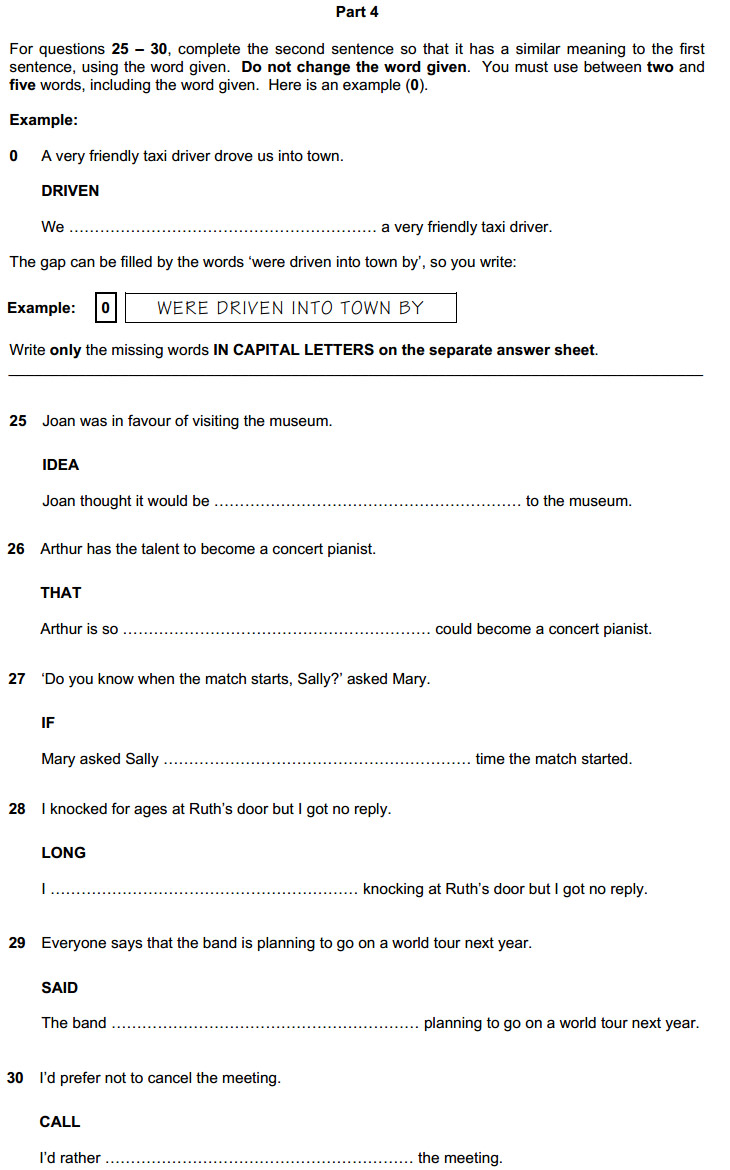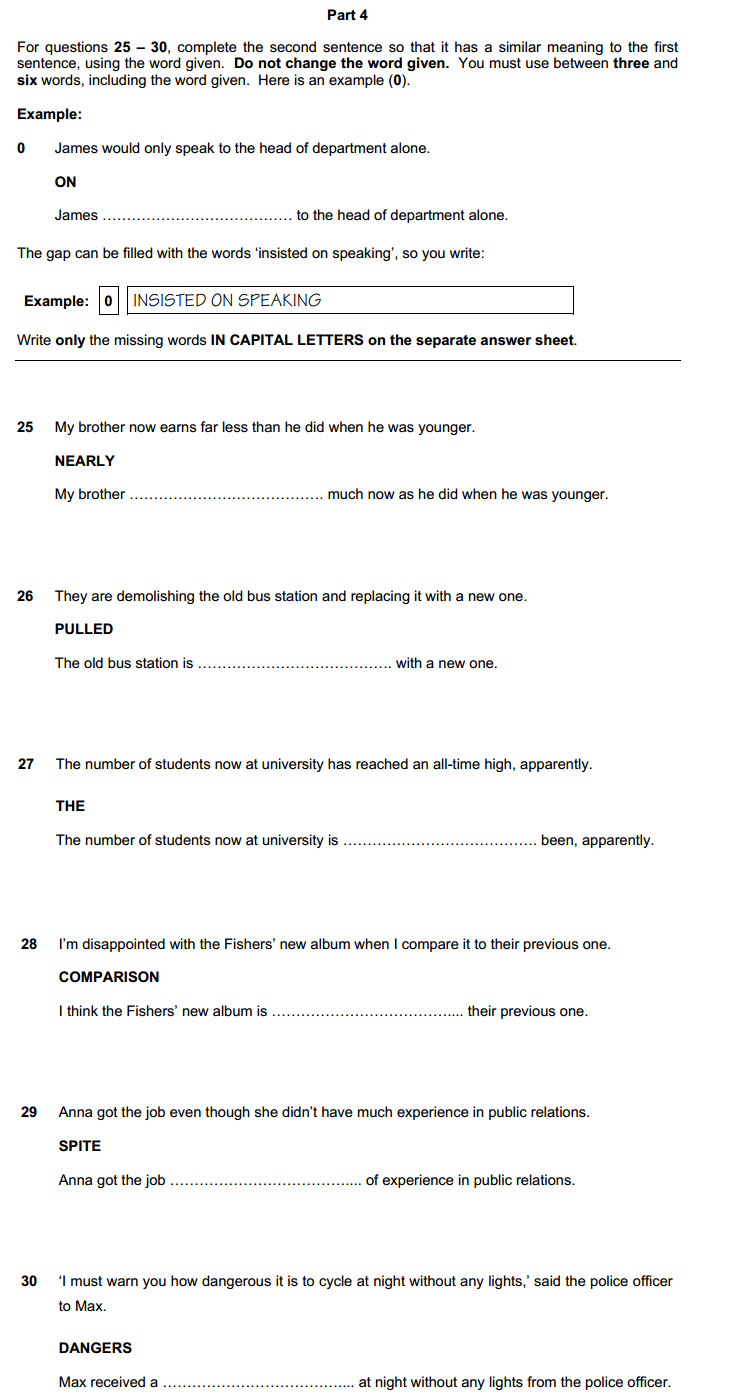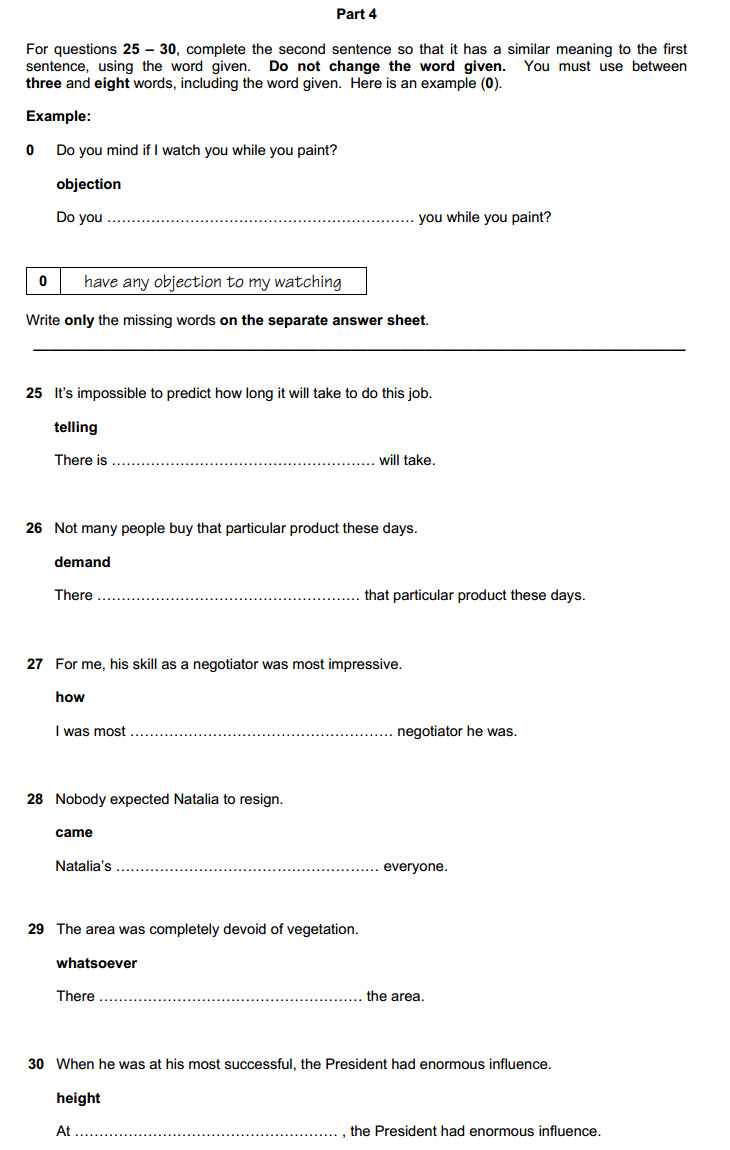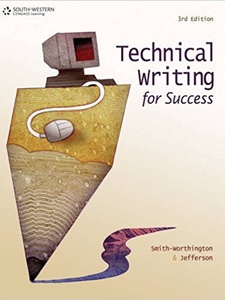-
Task Type: Word formation
-
Focus: Lexical-grammatical.
-
-
Format: A text containing 8 gaps. Each gap corresponds to a word. The stems
of the missing words are given beside the text and must be changed
to form the missing word.
-
-
Number of questions: 8.
-
How many marks are there: One mark for each correct answer.
What is testing:
- conversions from noun to adjective
- conversions from verb to noun
- conversions from adjective to adverb
- conversions from verb to adjectives
- conversions from a positive to negative form
General Advice
- Never leave the base word unchanged
- Look at each sentence and decide what kind of word is required
- Check the spelling carefully
- Tje words you need might have to change into a negative or plural
-
cambridge english first certificate (fce) test
Word Formation
- FCE : Word Formation 1
- FCE : Word Formation 2
- FCE : Word Formation 3
- FCE : Word Formation 4
- FCE : Word Formation 5
- FCE : Word Formation 6
- FCE : Word Formation 7
- FCE : Word Formation 8
- FCE : Word Formation 9
- FCE : Word Formation 10
- FCE : Word Formation 11
- FCE : Word Formation 12
- FCE : Word Formation 13
- FCE : Word Formation 14
- FCE : Word Formation 15
- FCE : Word Formation 16
- FCE : Word Formation 17
- FCE : Word Formation 18
- FCE : Word Formation 19
- FCE : Word Formation 20
by Adam Skimins 27th February 2022
- Article navigation:
- 50 Word Formation Exercises: FCE
- B2 First (FCE) Use of English: Part 3
- B2 First (FCE) Use of English: Part 3 Example Test
B2 First (FCE) Use of English: Part 3 question type is called word-formation.
For each gap you get one word in capitals which you have to change so the grammar and meaning fit in the sentence. Here you have to show how well you know word families and if you can change words by using prefixes and suffixes
50 Word Formation Exercises: FCE
Use the word in capitals to form a word that fits in the gap.
For each question, write your answer in the gap.
scientists are warning about the effects global warming will have on us. (SCIENCE)
Matt quickly came to the conclusion that Jane was not telling the truth.(CONCLUDE)
The arrival of our flight was delayed due to fog. (ARRIVE)
Both teams gave a wonderful performance in the match. (PERFORM)
Easter Island is famous for its astonishing statues. (ASTONISH)
The woman was hit so hard that she lost consciousness . (CONSCIOUS)
For their own safety the visitors of zoos are kept at a distance. (SAFE)
You should take the antibiotics for a whole week so that it is effective . (EFFECT)
Jane has been suffering from headaches lately . (LATE)
Most people believe that it is improbable that UFOS exist. (PROBABLE)
Use the word in capitals to form a word that fits in the gap.
For each question, write your answer in the gap.
Chris accepted the doctor’s news although it was very painful to hear. (PAIN)
The first settlers came from distant islands of the Pacific. (DISTANCE)
This area is very dry, and farming is very difficult. (FARM)
Divers went down to a depth of over 50 metres. (DEEP)
The book contains a collection of anecdotes from the past decades. (COLLECT)
Jack, who was an excellent shooter, repeatedly missed his target. (REPEAT)
My teacher has been putting together interesting articles for the yearbook.(INTEREST)
innovative farmers in Japan have figured out a way to produce square-shaped watermelons. (INNOVATE)
We had difficulty in deciding who would be the best for the job. (DIFFICULT)
Even wealthy people can’t buy everything. (WEALTH)
Use the word in capitals to form a word that fits in the gap.
For each question, write your answer in the gap.
You should always take special care with your appearance when you go for an interview (APPEAR).
The children’s behaviour at the party was dreadful (BEHAVE).
There’s a great shortage of houses in most major cities. (SHORT)
It is my belief that we will fly to Mars some day. (BELIEVE)
There is no comparison between his latest and his earlier books (COMPARE).
Is there any truth in the rumour that the Prime Minister is planning to resign? (TRUE)
We nearly died of boredom when we went to see the new opera. It was so dreadful (BORING)
Einstein sometimes came to the conclusion that he was wrong about a few things. (CONCLUDE)
She was extremely intelligent and passed all her exams with ease . (EASY)
They say that competition between companies helps to keep prices down. (COMPETE)
Use the word in capitals to form a word that fits in the gap.
For each question, write your answer in the gap.
The exhibition is currently on display at the new gallery. (EXHIBIT)
Unfortunately, travelling by plane also has some disadvantages . (ADVANTAGE)
There are several run-down districts in the city where housing is in a bad state (HOUSE).
In response to many complaints by residents, we decided to make the area a no-parking zone. (RESPOND)
He works for a company that imports diving equipment . (EQUIP)
He wrote an autobiography , in which he describes how he had gone through his troubling days as an adolescent. (BIOGRAPHY)
A limited edition of the author’s works will be published next year. (EDIT)
The percentage that banks charge for borrowing money has gone up. (PERCENT)
Many men believe that bringing up children is the responsibility of women. (RESPONSIBLE)
The judge sentenced the boy to two weeks of community service(SERVE).
Up to now the government’s conservation programme has been very successful. (CONSERVE)
Use the word in capitals to form a word that fits in the gap.
For each question, write your answer in the gap.
I am really grateful for your help. Maybe I can help you too sometime. (GREAT)
He turned out to be a big liar . I’ll never believe him again. (LIE)
A comparison of men’s salaries with those of women shows that females still get unequal pay. (COMPARE, EQUAL)
An automatic driving assistant can be useful in certain situations. (USE)
The departure halls of major airports are always full during the holiday season. (DEPART)
I had an appointment at the dentist’ so I had to call off everything else. (APPOINT)
He has physical abilities you can’t even dream of. (ABLE)
The coach made the decision to discipline three players of his team. (DECIDE)
I had no idea that the jewellery was so valuable . (VALUE)
politicians hardly ever tell the truth . (POLTICS, TRUE)
The children had a lively imagination . Look at what they drew! (LIVE, IMAGINE)
Would you pass B2 First (FCE)?
Sign up, resolve the tests and see what results you get.
Sign up
B2 First (FCE) Use of English: Part 3
Strategy:
- Read the text for general understanding.
- Decide what type of word you need for each gap (e.g. noun, adjective, etc.).
- Look at the whole sentence, not just al the line containing the gap.
- You may need to add a prefix or suffix to some words.
- Read through the text and check that your words make sense.
- Check your spelling.
Tips:
You need to read the whole text to get the writer’s opinion on the topic. That’s because sometimes a negative prefix will be required. There is usually at least one word requiring a negative prefix, so look out for these.
In the exam always write something. You never know, you might be lucky even if you are not sure of the answer!
B2 First (FCE) Use of English: Part 3 Example Test
Use the word in capitals to form a word that fits in the gap.
For each question, write your answer in the gap.
Malta
A history of human habitation HABITAT which stretches over seven millennia and a vital location at the heart of the Mediterranean have brought both wealth and conflict to Malta. This history is witnessed by great buildings constructed in the beautiful BEAUTY golden limestone that gives the island its name – Melita, the island of honey. mysterious MYSTERY megalithic temples date back to 4000BC and reveal the technical TECHNIQUE capabilities of these earliest inhabitants. Phoenicians, Carthaginians and Romans left their traces, to be followed by Arabs and Normans.
The Knights of the order of St John made the island their headquarters from the 16th century and built great fortifications FORTIFY , palaces, public buildings and St John’s Cathedral with its eight ornate chapels dedicated to each of the langue or nations of the Order. Ottoman expansion EXPANSE in the Mediterranean was halted by the Knights’ successful defense DEFEND of the islands. This was echoed four centuries later by heroic resisitance RESIST under British rule during World War II, a feat which earned the island the George Cross – the only time an entire country has been given such an honour.
FCE, CAE, CPE
Practice Tests Online
Get your writing checked, track your progress online.
Sample papers, online practice tests & tips.
Would you pass B2 First (FCE)?
Sign up, resolve the tests and see what results you get.
Sign up
В этой статье мы разберем структуру заданий одной из самых значимых частей кембриджских экзаменов Use of English (использование английского — грамматика и лексика) и поделимся советами по их успешному выполнению.
В блоге уже выходили статьи о том, как сдать Writing (письменную часть), Reading (чтение) и Listening (аудирование) на экзаменах FCE, CAE, CPE — советуем ознакомиться с этими материалами. Теперь перейдем к тому, как подготовиться к части Use of English экзаменов FCE, CAE, СPE.
Типы заданий в части Use of English
Раздел Use of English экзаменов FCE, CAE и CPE объединен с разделом Reading. На выполнение всей части Reading and Use of English вам дадут 1 час 15 минут на экзамене FCE и 1 час 30 минут на CAE и CPE. За это время вам надо выполнить порядка 7-8 заданий. Первые 4 задания относятся к части Use of English, которая проверяет ваш словарный запас и знание грамматики, а остальные — к части Reading.
Давайте посмотрим, из каких заданий состоит Use of English на кембриджских экзаменах:
| Экзамен | Multiple choice cloze | Open cloze | Word formation | Key word transformations |
|---|---|---|---|---|
| FCE, CAE, CPE | Part 1 8 предложений по 1 баллу |
Part 2 8 предложений по 1 баллу |
Part 3 8 предложений по 1 баллу |
Part 4 4-6 предложений по 2 балла |
Экзамены совпадают по структуре, баллам и количеству заданий, но отличаются по степени сложности. Разберем примеры заданий Кембриджских экзаменов с официального сайта: FCE, CAE и CPE.
Part 1: Multiple-choice cloze (выбрать правильный ответ из нескольких предложенных)
Суть задания: Вам нужно заполнить пропуски в тексте, выбрав одно из предложенных четырех слов. Всего пропущено 8 слов. В этом задании проверяется словарный запас (vocabulary) — знание фразовых глаголов, устойчивых выражений, идиом, оттенков значений и т. п.
Техника выполнения: Чтобы получить общее представление о тексте, прочитайте его, не обращая внимания на пропущенные слова. Далее внимательно читайте каждое предложение и варианты ответа. Исключите варианты, которые явно не подходят, затем из оставшихся выберите тот, который логически дополнит предложение и будет сочетаться с рядом стоящими словами. Рассмотрим пример:
They couldn’t (1)… a decision and agreed to meet again after lunch.
a) arrive
b) achieve
c) reach
d) attain
Хорошо зная устойчивые словосочетания, вы выберите вариант reach.
I like to go to the beach (2)… my wife likes to stay in and watch a TV show.
a) then
b) where
c) when
d) whereas
Однозначно не подходят варианты then (в примере указаны не последовательные действия, а параллельные) и where (нелогично, она в номере смотрит шоу, а не на пляже). Выбирая между when и whereas, следует предпочесть «в то время как», в значении противопоставления, а не просто «когда». Правильный ответ — whereas.
Пример задания multiple choice cloze на экзамене FCE
Пример задания multiple choice cloze на экзамене CAE
Пример задания multiple choice cloze на экзамене CPE
Part 2: Open cloze (вставить слово в предложение без вариантов ответа)
Суть задания: Нужно вновь заполнить пропуски в тексте словами, подходящими по смыслу. Пропущено 8 слов, но в этот раз вам не предлагают никаких вариантов.
Техника выполнения: Прочтите текст, не обращая внимания на пропущенные слова. Затем прочитайте внимательно каждое предложение. Обратите внимание, какие слова стоят до и после пропущенного слова. Они подскажут вам, к какой части речи относится это слово, число или время, в котором оно должно стоять. Например:
I really (1)… like this picture! It’s a masterpiece.
Очевидно, что предложение вполне самодостаточное и без вставки. Вместе с тем вы можете увидеть, что перед вами эмоциональное высказывание. Значит, правильно будет вспомнить про вспомогательный глагол do в функции усиления — I really do like this picture! It’s a masterpiece.
The concert has been cancelled (2)… to the epidemic situation in the city.
В первой части предложения — следствие, а во второй — причина. Мы не можем вставить because, так как после него употребляется предлог of, a не to. Необходимо рассмотреть другие варианты, близкие по значению к «потому что» и «из-за». Отлично подойдут owing и due. Иногда могут подходить сразу два варианта ответа, каждый из них будет правильным, но вам все равно нужно вписать один.
Пример задания open cloze на экзамене FCE
Пример задания open cloze на экзамене CAE
Пример задания open cloze на экзамене CPE
Part 3: Word formation (словообразование)
Суть задания: Вам нужно заполнить пропуски в тексте, образуя однокоренные слова от предложенных. Это задание проверяет насколько грамотно вы используете словарный запас.
Техника выполнения: Следует прочитать текст несколько раз — сначала бегло, а затем вдумчиво, обращая внимание на key words и слова, которые идут до и после него. Это поможет вам правильно определить часть речи производного слова. Большинство слов изменяются с помощью приставок, суффиксов и окончаний, например: courage – discourage, circle – circular, health – unhealthy, employ – unemployed. Переведите предложение, чтобы убедиться в правильности выбранной части речи.
Самые распространенные ошибки при выполнении этого задания:
- Путаница в отрицательных и положительных характеристиках
Don’t be so …, I’ll finish the task in a minute. (patience)
Если не обратить внимание на отрицание (don’t be) и использовать прилагательное patient (производное от patience), то это будет ошибкой. Правильный ответ — impatient.
Чтобы избежать ошибки, внимательно читайте весь текст и следите за логикой предложения.
- Неправильная часть речи
My boyfriend is not very … about the idea of going to New York. (enthusiasm)
Правильный ответ — прилагательное enthusiastic. Если использовать вместо него наречие enthusiastically, это будет ошибкой. Выбор наречия вместо прилагательного и наоборот — распространенная ошибка.
- Ошибки в выборе единственного или множественного числа
Tina’s husband is one of the strongest … in her business. (support)
Правильный ответ — supporters. Единственное число — supporter — будет ошибкой. Сбить может тот факт, что мы говорим об одном человеке, но ведь в предложении есть конструкция one of (один из).
- Орфографические ошибки
Чтобы избежать орфографических ошибок, необходимо регулярно практиковать правописание и не лениться проверять слова в словаре.
Пример задания word formation на экзамене FCE
Пример задания word formation на экзамене CAE
Пример задания word formation на экзамене CPE
Part 4: Key word transformations (перефразирование предложения с использованием ключевого слова)
Суть задания: Вам даны предложение и ключевое слово/словосочетание. Необходимо преобразовать предложение таким образом, чтобы в него вошло данное ключевое слово/словосочетание, учитывая ограничения по количеству слов, указанных в задании. Полученное предложение не должно отличаться по смыслу от исходного.
Техника выполнения: Прочитайте исходное предложение и вспомните все устойчивые выражения и фразы с указанным key word. Затем прочитайте второе предложение с пропуском. При трансформации предложения вы не должны выходить за рамки указанного количества слов в задании (с учетом key word). Конечно, нельзя изменять key word. Например, если дано wish, не стоит использовать wishes или wishing. Если дано not, нельзя вместо него использовать no. Также проверяйте, нет ли в вашем ответе лишних слов. Разберем пример:
I regret ever telling her about my private life. (wish)
I ____________________ her about my private life.
Правильный ответ — I wish I had not told her about my private life.
В приведенном примере местоимение her уже есть в предложении с пропуском. Если напишете wish I had not told her вместо wish I had not told, это будет ошибкой. За каждое верно перефразированное предложение вы получаете два балла, и один балл, если вы допустили небольшую ошибку.
Пример задания key word transformations на экзамене FCE
Пример задания key word transformations на экзамене CAE
Пример задания key word transformations на экзамене CPE
Хотите получить международный сертификат? Записывайтесь на курс подготовки к экзаменам.
Как успешно сдать Use of English — 7 советов
- При подготовке много читайте. Желательно, чтобы тексты были различной тематики. Отдавайте предпочтение газетным и научным статьям. Выбирайте серьезные издания, например, The Washington Post или The Guardian. Читая тексты, выписывайте и учите новую для вас лексику, также изучайте и повторяйте готовые подборки устойчивых выражений и идиом. Например, их можно найти в учебной серии Oxford Word Skills Intermediate и Advanced.
- Относитесь к грамматике как к инструменту, который на экзамене поможет вам точно выразить свои мысли. Разбирайте грамматические правила и отрабатывайте их.
- Выполняйте пробные тесты и тренируйтесь распределять время на каждый тип заданий. Обратите внимание, что необходимо брать тестовые задания, изданные не ранее 2015 года, потому что в этом году произошли изменения в формате кембриджских экзаменов.
- Не зацикливайтесь на одном задании. Если вы сомневаетесь, напишите возможные варианты ответа на полях и продолжайте выполнять тест. К пунктам, в которых вы не уверены, вернитесь позже.
- Проверяйте свои ответы каждый раз, как выполнили задание.
- Пользуйтесь подходящими ресурсами:
- Cambridge English Exam Booster — пособие содержит 48 экзаменационных заданий. В книге рассмотрены типичные ошибки и даны рекомендации для успешной сдачи экзамена.
- Cambridge English First 2, Cambridge English Advanced 2 и Cambridge English Proficiency 2 — каждая книга содержит 4 теста для каждого из экзаменов. Пособия ознакомят вас с содержанием и форматом экзаменов FCE, CAE и CPE.
- Cambridge English Teacher Rory — советы по подготовке к FCE и CAE от преподавателя и носителя языка Рори.
- Floe-Joe — тренировочные упражнения в формате экзаменов FCE, CAE, CPE.
- Рекомендуем найти преподавателя, который сам получил международный сертификат и у которого есть опыт подготовки студентов к экзамену. Такой учитель не только проработает с вами типовые задания, но и расскажет о методике сдачи экзамена исходя из своего опыта. Он поможет вам правильно организовать подготовку, структурировать информацию, поделится психологическими приемами. Если вы в поиске такого учителя, обратитесь в нашу школу, и менеджеры подберут преподавателя, который поможет вам сдать экзамен на высокий балл.
Желаем успехов в сдаче экзаменов!
© 2023 englex.ru, копирование материалов возможно только при указании прямой активной ссылки на первоисточник.
Recommended textbook solutions
The Language of Composition: Reading, Writing, Rhetoric
2nd Edition•ISBN: 9780312676506Lawrence Scanlon, Renee H. Shea, Robin Dissin Aufses
661 solutions
Literature and Composition: Reading, Writing,Thinking
1st Edition•ISBN: 9780312388065Carol Jago, Lawrence Scanlon, Renee H. Shea, Robin Dissin Aufses
1,697 solutions
Technical Writing for Success
3rd Edition•ISBN: 9780538450485 (3 more)Darlene Smith-Worthington, Sue Jefferson
468 solutions
Edge Reading, Writing and Language: Level C
ISBN: 9781285439594David W. Moore, Deborah Short, Michael W. Smith
304 solutions
- Home
-
Education
- FCE exam practice Use of English Word formation part 3 explained
JOB INTERVIEWS- word formation part Many people feel very (0) nervous about job interviews but remember the interviewers must have liked your (1) , so you only have to live up to their (2) . I Before you go into the interview room, take a few deep (3) . If you think about something nice, that brings you a feeling of (4) then you will smile, and give an impression of (5) . Make sure that you take all the right papers with you — if you forget something, you could look (6) . If they ask why you left your last job, don’t give a long (7) . You have a right to your (8) and so do your previous employers. Any future employer will like it if you show (9) to your old boss. Take your time to answer questions, and relax. If you follow this (10) , you have a good chance of getting the job!
-
Author
-
View
1.384 -
Download
7
Embed Size (px)
DESCRIPTION
It’s a part 3 of the Use of English FCE exam. The explanation and the answers are also included. For more please visit http://telcuk.com/learn-english-online/ where you can find plenty of on-line resources for FCE and IELTS exam together with general English practice activities for speaking, writing, reading and listening.
Text of FCE exam practice Use of English Word formation part 3 explained
JOB INTERVIEWS- word formation partMany people feel very (0) nervous about job interviews but remember the interviewers must have liked your (1) , so you only have to live up to their (2) . I Before you go into the interview room, take a few deep (3) . If you think about something nice, that brings you a feeling of (4) then you will smile, and give an impression of (5) . Make sure that you take all the right papers with you — if you forget something, you could look (6) . If they ask why you left your last job, don’t give a long (7) . You have a right to your (8) and so do your previous employers. Any future employer will like it if you show (9) to your old boss. Take your time toanswer questions, and relax. If you follow this (10) , you have a good chance of getting the job!
JOB INTERVIEWS- word formation partMany people feel very (0) nervous about job interviews but remember the interviewers must have liked your (1) , so you only have to live up to their (2) . I Before you go into the interview room, take a few deep (3) . If you think about something nice, that brings you a feeling of (4) then you will smile, and give an impression of (5) . Make sure that you take all the right papers with you — if you forget something, you could look (6) . If they ask why you left your last job, don’t give a long (7) . You have a right to your (8) and so do your previous employers. Any future employer will like it if you show (9) to your old boss. Take your time toanswer questions, and relax. If you follow this (10) , you have a good chance of getting the job!
‘your’ is a pronoun, normally after a pronoun we need a NOUN
JOB INTERVIEWS- word formation partMany people feel very (0) nervous about job interviews but remember the interviewers must have liked your (1) , so you only have to live up to their (2) . I Before you go into the interview room, take a few deep (3) . If you think about something nice, that brings you a feeling of (4) then you will smile, and give an impression of (5) . Make sure that you take all the right papers with you — if you forget something, you could look (6) . If they ask why you left your last job, don’t give a long (7) . You have a right to your (8) and so do your previous employers. Any future employer will like it if you show (9) to your old boss. Take your time toanswer questions, and relax. If you follow this (10) , you have a good chance of getting the job!
‘their’ is a pronoun, normally after a pronoun we need a NOUN. In this case the noun is plural
JOB INTERVIEWS- word formation partMany people feel very (0) nervous about job interviews but remember the interviewers must have liked your (1) , so you only have to live up to their (2) . I Before you go into the interview room, take a few deep (3) . If you think about something nice, that brings you a feeling of (4) then you will smile, and give an impression of (5) . Make sure that you take all the right papers with you — if you forget something, you could look (6) . If they ask why you left your last job, don’t give a long (7) . You have a right to your (8) and so do your previous employers. Any future employer will like it if you show (9) to your old boss. Take your time toanswer questions, and relax. If you follow this (10) , you have a good chance of getting the job!
‘deep’ is an adjective, normally after an adjective we need a NOUN. In this case the noun is plural as we have ‘a few’ meaning plural before ‘deep’
JOB INTERVIEWS- word formation partMany people feel very (0) nervous about job interviews but remember the interviewers must have liked your (1) , so you only have to live up to their (2) . I Before you go into the interview room, take a few deep (3) . If you think about something nice, that brings you a feeling of (4) then you will smile, and give an impression of (5) . Make sure that you take all the right papers with you — if you forget something, you could look (6) . If they ask why you left your last job, don’t give a long (7) . You have a right to your (8) and so do your previous employers. Any future employer will like it if you show (9) to your old boss. Take your time toanswer questions, and relax. If you follow this (10) , you have a good chance of getting the job!
‘of’ is a preposition, very often after a preposition we need a NOUN.
JOB INTERVIEWS- word formation partMany people feel very (0) nervous about job interviews but remember the interviewers must have liked your (1) , so you only have to live up to their (2) . I Before you go into the interview room, take a few deep (3) . If you think about something nice, that brings you a feeling of (4) then you will smile, and give an impression of (5) . Make sure that you take all the right papers with you — if you forget something, you could look (6) . If they ask why you left your last job, don’t give a long (7) . You have a right to your (8) and so do your previous employers. Any future employer will like it if you show (9) to your old boss. Take your time toanswer questions, and relax. If you follow this (10) , you have a good chance of getting the job!
‘of’ is a preposition, very often after a preposition we need a NOUN.
JOB INTERVIEWS- word formation partMany people feel very (0) nervous about job interviews but remember the interviewers must have liked your (1) , so you only have to live up to their (2) . I Before you go into the interview room, take a few deep (3) . If you think about something nice, that brings you a feeling of (4) then you will smile, and give an impression of (5) . Make sure that you take all the right papers with you — if you forget something, you could look (6) . If they ask why you left your last job, don’t give a long (7) . You have a right to your (8) and so do your previous employers. Any future employer will like it if you show (9) to your old boss. Take your time toanswer questions, and relax. If you follow this (10) , you have a good chance of getting the job!
‘you could look…how??- how refers to the adjective. Positive or negative?
JOB INTERVIEWS- word formation partMany people feel very (0) nervous about job interviews but remember the interviewers must have liked your (1) , so you only have to live up to their (2) . I Before you go into the interview room, take a few deep (3) . If you think about something nice, that brings you a feeling of (4) then you will smile, and give an impression of (5) . Make sure that you take all the right papers with you — if you forget something, you could look (6) . If they ask why you left your last job, don’t give a long (7) . You have a right to your (8) and so do your previous employers. Any future employer will like it if you show (9) to your old boss. Take your time toanswer questions, and relax. If you follow this (10) , you have a good chance of getting the job!
‘long’ is an adjective, normally after an adjective we need a NOUN. In this case the noun is singular as we have ‘a’- an article.
JOB INTERVIEWS- word formation partMany people feel very (0) nervous about job interviews but remember the interviewers must have liked your (1) , so you only have to live up to their (2) . I Before you go into the interview room, take a few deep (3) . If you think about something nice, that brings you a feeling of (4) then you will smile, and give an impression of (5) . Make sure that you take all the right papers with you — if you forget something, you could look (6) . If they ask why you left your last job, don’t give a long (7) . You have a right to your (8) and so do your previous employers. Any future employer will like it if you show (9) to your old boss. Take your time toanswer questions, and relax. If you follow this (10) , you have a good chance of getting the job!
‘your’ is a pronoun, normally after a pronoun we need a NOUN
JOB INTERVIEWS- word formation partMany people feel very (0) nervous about job interviews but remember the interviewers must have liked your (1) , so you only have to live up to their (2) . I Before you go into the interview room, take a few deep (3) . If you think about something nice, that brings you a feeling of (4) then you will smile, and give an impression of (5) . Make sure that you take all the right papers with you — if you forget something, you could look (6) . If they ask why you left your last job, don’t give a long (7) . You have a right to your (8) and so do your previous employers. Any future employer will like it if you show (9) to your old boss. Take your time toanswer questions, and relax. If you follow this (10) , you have a good chance of getting the job!
‘if you show’…. what? — what refers to a noun. Noun is missing
JOB INTERVIEWS- word formation partMany people feel very (0) nervous about job interviews but remember the interviewers must have liked your (1) , so you only have to live up to their (2) . I Before you go into the interview room, take a few deep (3) . If you think about something nice, that brings you a feeling of (4) then you will smile, and give an impression of (5) . Make sure that you take all the right papers with you — if you forget something, you could look (6) . If they ask why you left your last job, don’t give a long (7) . You have a right to your (8) and so do your previous employers. Any future employer will like it if you show (9) to your old boss. Take your time toanswer questions, and relax. If you follow this (10) , you have a good chance of getting the job!
‘this’ is a pronoun, normally after a pronoun we need a NOUN
JOB INTERVIEWS- word formation partMany people feel very (0) nervous about job interviews but remember the interviewers must have liked your (1) (n) application , so you only have to live up to their (2) (n) expectations. I Before you go into the interview room, take a few deep (3)(n) breaths. If you think about something nice, that brings you a feeling of (4) (n) happiness then you will smile, and give an impression of (5)(n) confidence. Make sure that you take all the right papers with you — if you forget something, you could look (6)(adj) unprofessional. If they ask why you left your last job, don’t give a long (7)(n) explanation. You have a right to your (8)(n) privacy and so do your previous employers. Any future employer will like it if you show (9)(n) loyalty to your old boss. Take your time to answer questions, and relax. If you follow this (10)(n) advice, you have a good chance of getting the job!
0 nerve1 apply2 expect3 breathe4 happy5 confident6 profession7 explain8 private9 loyal10 advise

